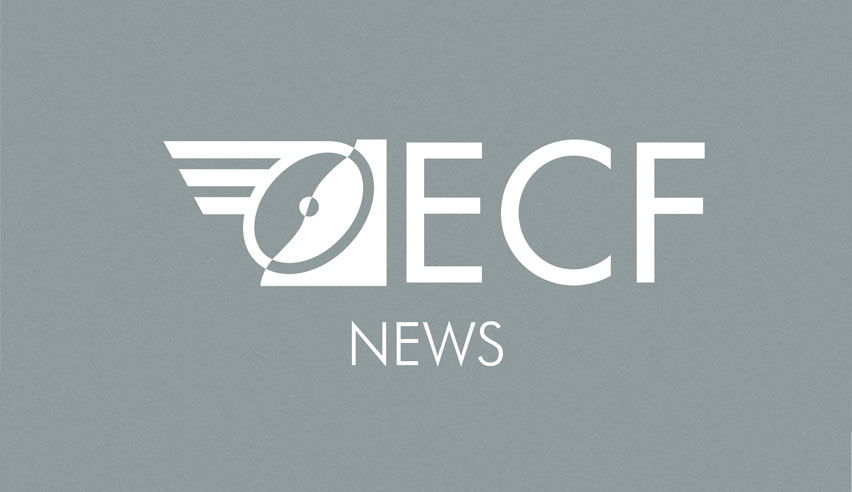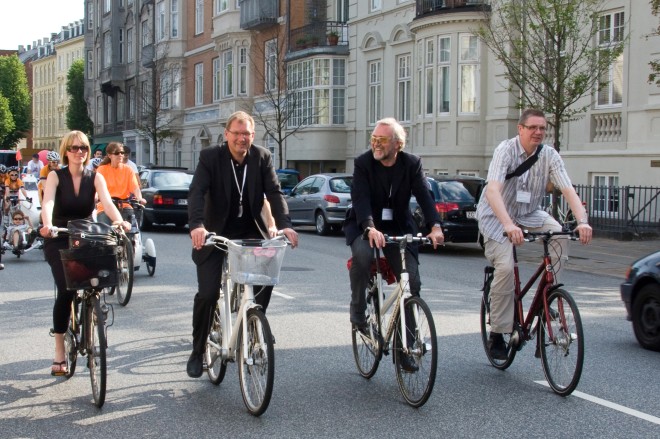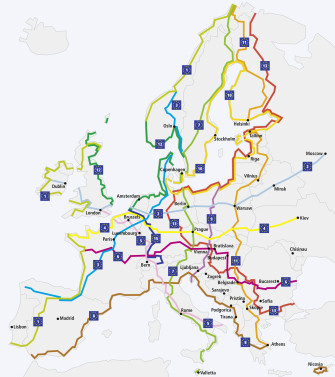
The Danish EU Presidency 2012 – riding towards a green and responsible Europe!

ECF and Danish Politicians riding in the Great Bicycle Parade in Copenhagen 2010. From the right: ECF Secretary General, Bernhard Ensink; ECF President, Manfred Neun, Former Technical Mayor of Copenhagen, Bo Asmus Kjeldgaard; Current Minister of the Environment, Ida Auken. Credit: Mikael Colville-Andersen/Copenhagenize
From Poland to Denmark
The same day Poland handed over the EU presidency to Denmark, the Minister for the Environment, Ida Auken, reached out her hand to welcome a Polish environmental activist, Dominik Dobrowolski, who had just ridden 1000km in wind and snow on his bicycle, to Copenhagen. Dominik’s slogans are ‘Stop CO2 – Get Moving!’ and ‘Reduce, Reuse, Recycle’ and his visit to Copenhagen had the single purpose of ensuring that Danish politicians would prioritize this topic when they handed the EU Presidency. He did not come in vain! The Minister agreed with Dobrowolski: “We’re not only in the middle of an economic crisis but a crisis of resources. They cannot be solved independently. We have to think green and recycle to have resources enough for growth” the Danish newspaper, MetroXpress, reported her saying.
ECF’s 6 key messages are:
1. Focus on the modal shift.
2. Create an EU cross-service strategy on non-motorized transport.
3. Increase investment in cycling infrastructure.
4. Include EuroVelo within the TEN-T Network.
5. Take further steps developing SUMPs.
6. Incorporate cycling in the EU framework for internalization of external costs.
ECF’s key messages to help a responsible, dynamic, green and safe Europe on its way
The Danish Presidency aims for a responsible, dynamic, green and safe Europe, and like Dobrowski, ECF has high expectations of the Danish Presidency and its green and responsible focus. To ensure that the bicycles aren’t forgotten at negotiation tables, ECF and DCF have produced a memorandum spelling out the key priorities from a bicycle policy perspective.
In brief, the key messages go like this:
1. Focus on the modal shift.
More attention should be given to encouraging people to consider alternative forms of transport rather than continuing their accustomed mobility patterns (e.g. through awareness raising campaigns). As in other fields of life, marketing plays a crucial role.
In terms of passenger transport, a modal shift in urban centers is much needed. In order to reduce congestion, a more efficient use of urban space is required, i.e. by increasing walking and cycling at the expense of individual motorized transport.
2. Create an EU cross-service strategy on non-motorized transport.
The EC Policy Orientations on Road Safety 2011 – 2020 state: "Given the significant environmental, climate, congestion and public health benefits of cycling, it merits reflection whether more could be done in this area."
It is now time for this ‘reflection’ to be put onto paper as a Master Plan for Walking and Cycling. Countries that have presented a strategic plan on cycling in the past include Austria, Belgium (Flanders, Brussels, Wallonia), Czech Republic, Denmark, Finland, France, Germany, Hungary, Ireland, Lithuania, the Netherlands, Malta, Slovenia and the UK. Europe also needs such a strategy if it is to fully tap into the potential of walking and cycling. (Maybe incl. pic of the German National Cycle Master Plan 2002 – 2012.)
ECF is managing the development of EuroVelo, which aims to create a network of long-distance cycle routes connecting the continent. EuroVelo routes provide key links between and within urban areas and its completion would considerably improve the mobility of European citizens, in a sustainable and energy-efficient manner.
3. Increase investment in cycling infrastructure.
As the EC Policy Orientations on Road Safety 2011 – 2020 suggests, cyclists should be entitled to better infrastructure in order to improve road safety. 15% of EU co-funding in transport should be allocated to walking and cycling. At the moment only 0.7% of EU co-funding in transport is earmarked for cycling.
4. Include EuroVelo within the TEN-T Network.
The Trans-European Transport Network (TEN-T) is central to the future infrastructure of Europe.
The efforts of the Council to revise the TEN-T guidelines, and the related proposal on financing transport infrastructure should therefore be a high priority for the Danish Presidency. Integrating the EuroVelo Network into TEN-T should be equally high on the transport agenda. It should be considered as an opportunity to promote European trans-border cycling infrastructure networks, as well supporting soft mobility and sustainable tourism.
5. Take further steps developing SUMPs.
Sustainable Urban Mobility Plans (SUMPs) represent a primary way to promote walking, cycling and public transport. The Commission should take further steps to support local authorities through incentives and recommendations in developing sustainable urban mobility plans.
6. Incorporate cycling in the EU framework for internalization of external costs.
Cycling saves the European economy 91 billion Euro annually. As the savings generated from cycling are largely derived from cycling’s health benefits, a horizontal policy covering the different policy fields must include cycling in the EU framework for internalization of external costs and its application guidelines.
Only time can tell how much influence the Danish green and responsible intentions will have on the EU Council decisions, but one thing is for sure: ECF will be joining in with all its pedal power to get as many bicycle friendly decisions on the table as possible during the Danish Presidency.
About:
Read the full version of The DCF and ECF Memorandum Danish Presidency I/2012:
DCF and ECF Memorandum Danish presidency 2012
Read the Danish Presidency program in the field of transport:
Contact the author
Recent news!
Upcoming events
Contact Us
Avenue des Arts, 7-8
Postal address: Rue de la Charité, 22
1210 Brussels, Belgium










